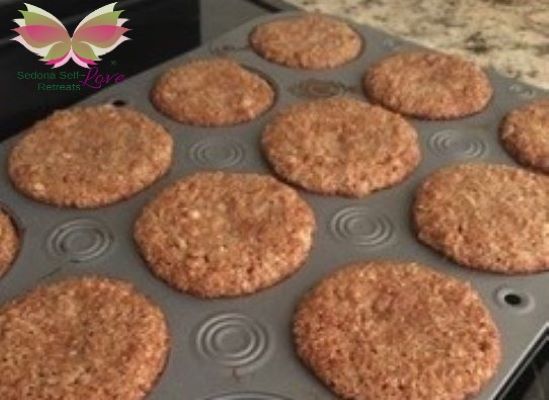
Are Bran Muffins the New Cupcake?
Only this craze fosters good looks, health, and well-being!
After a recent colonoscopy I was happy to find out my intestines were clear of polyps, lesions, cancer, Crohn’s Disease, and inflammation, but they did send me home with a few pamphlets. After all, the procedure was warranted by a host of mysterious digestive problems. A high fiber diet pamphlet seemed routine as a follow up, but as I read through it, I realized I was definitely falling short of the daily recommended 21-25 grams of fiber suggested per day for women (for men it is 30-38 grams).
People have figured out how to lose weight quickly with various dietetic approaches like KETO and other low carbohydrate diets, but are those diets sustainable? The lesser known health compromises attributed to high fat, high protein, low carb diets affect digestion and elimination- which equates to nutrition and detoxification.
Weight loss aside, a high-fiber diet has many benefits. I decided to start eating 20 plus grams of fiber a day and found it was quite strategic, like you really can’t put anything in your mouth unless it has good fiber content to meet the RDA and still manage your calories. I was easily motivated to give it a try since fiber, also known as roughage or bulk, absorbs large amounts of water which creates softer, bulkier poops reducing pressure against the wall of the colon promoting an easier passage of waste. Eliminating waste is the key word here, since I do believe in detoxing through diet.
Benefits:
Fewer toxins in blood
More regular bowel movements
Fewer “bad” colon bacteria
More “good” colon bacteria
Better control of blood sugar
Lower risk of obesity
Healthier colon
Better immune function, which may reduce infections
Better absorption of calcium, which leads to stronger bones
This list appealed to me on every front. I have been diagnosed with osteopenia, I continually strive to eat a super food diet, and I’ve been dealing with belly-weight gain that I cannot seem to budge – even with a carb reduction. It turns out, most Americans eat only 10-15 grams of fiber a day and, sure enough, that was me. As I started counting fiber, I quickly discovered the foods I could eat and made a simple list to count my fiber content per meal and refer back to. This made it easy to reach 20-25 grams a day as I was learning to create meals with enough fiber. In contrast to the American diet, the rural African diet is very rich in plant fiber- over 50 grams a day- and this speeds up the time to digest and expel wastes. For these rural Africans it takes one-third the time to digest and eliminate the foods they eat compared to people living in Western cultures. This may be the reason they suffer from fewer intestinal diseases than Westerners.
Intestinal problems like colon diverticulosis occurs when pockets (diverticuli) of tissue bulge out from the bowel wall due to increased pressure in bowel. The colon, or large intestine, begins in the lower right abdomen and forms a large question mark that ends in the rectum. The colon is packed with over 2000 different kinds of bacteria, many of which provide health benefits to the body. The most beneficial bacterial rely on plant fibers for their own good health. Having lots of “good” bacteria can reduce the number of cancer-causing substances in the colon. This is why eating plant foods may help protect the colon.
Fiber is the part of the plant that the human body cannot digest and falls into two groups: insoluble and soluble. These two types of fiber are important for maintaining intestinal health, maintaining a healthy weight, reducing cholesterol, and controlling blood sugar. Insoluble fiber is indigestible and absorbs water producing larger softer stool and more regular bowel movements. This is important in preventing disorders such as constipation, hemorrhoids, and diverticulosis (the inflamed or infected version of diverticulitis) and at the same time aid in sweeping certain toxins and carcinogens out of the body.
Insoluble fiber examples:
Whole grains
Corn bran (including popcorn)
Nuts and seeds
Most green veggies
Certain fruits (apple, oranges, bananas, avocado, tomato, kiwi)
Soluble fiber examples:
Oats, rye, barley
Legumes (peas, beans)
Fruits (berries, plums, apples, bananas, pears)
Most root veggies (potatoes, carrots)
Supplements like psyllium made from the husks of plants
Prebiotic fiber examples:
Many of these are high FODMAP, so cross check if you are following that diet or experiment with the FODMAP diet if you experience gas or bloating.
Asparagus
Yams
Garlic
Onions
Bananas
Leeks
Agave
Chicory
Wheat, rye, barley
Antioxidants are other substances in plant-based food that can help to prevent heart disease, eye problems, and some cancers.
The bowel really has a very simple job of removing some of the water from stool and shaping it for elimination. Without fiber there is not much to shape and the bowel wall stops “exercising” i.e. peristalsis and becomes flabby and week i.e. diverticulosis. A high fiber diet reduces pressure in the colon by increasing the bulk in the stool, giving the intestines something to shape/exercise and this can help reduce or even stop the development of diverticulosis or its complications (diverticulitis).
Heart disease is prominent in our culture, as well, and a high fiber diet can lower cholesterol and triglyceride levels in the blood. Oat fiber and psyllium, in particular, may help prevent some types of heart diseases.
Recent digestive issues prompted my colonoscopy, and I learned that IBS, disorders of the lower digestive system, is really a catch-all term for a myriad of digestive issues, explained and otherwise. Digestion is quite particular to the individual and there are many factors that make for easy or difficult and painful digestion. Good and bad bacteria in the colon plays a critical role in this process. IBS is not technically a disease, but the inflammation and unwanted bacteria cause unpleasant symptoms such as constipation, diarrhea (or both alternately), bloating, abdominal pain and cramps. Acute episodes can be triggered by emotional stressors, tension, and anxiety, poor eating habits, and medications. I follow a FODMAP diet and so it was easy to increase my fiber intake without creating the harmless gases that can cause bloating. If you increase your fiber and experience bloating I suggest researching a FODMAP diet.
FODMAP stands for Fermentable Oligosaccharides, Disaccharides, Monosaccharides and polyols, which are short-chain carbohydrates (sugars) that the small intestine absorbs poorly. Some people experience digestive distress after eating them. Symptoms include: Cramping.
And so I focused on the highest fiber foods that I could tolerate and got inspired to make bran muffins and plan a day of fiber rich meals. Immediately I felt 100 percent better!
You can make your own substitutions from this classic bran muffin recipe, but try not to eat too many at once, like someone I know…
My version is VEGAN:
• 1 ½ cups wheat bran – these are flakes in a clear bag
• 1 cup buttermilk – I used oat milk
• ⅓ cup vegetable oil – I used raw coconut oil
• 1 egg – 1 ripe banana or 1 T applesauce
• ⅔ cup brown sugar – I used slightly less sugar. 1/2 C. + 1/2 of a 1/3 C. Organic sugar
• ½ teaspoon vanilla extract – out of vanilla I used Orange essential oil and my mom used orange zest from a whole orange.
• 1 cup all-purpose flour
• 1 teaspoon baking soda
• 1 teaspoon baking powder
• ½ teaspoon salt
• ½ cup raisins – instead I used chopped walnuts and 2 T of chopped fresh ginger
Follow the directions otherwise. I greased my muffin tin with the coconut oil and baked for closer to 10 minutes and then let them cool in the pan. They are so yummy!!!!! I put them in the freezer and pull out 1 in the morning to have with my morning coffee.
~ Marnie Mills, Sedona Self-Love Retreats Practitioner
Sedona: Heart Chakra of the Earth
Sedona is widely regarded as the planet’s heart chakra - a place where energy flows in a way that awakens love, harmony, and unity.
Men’s Healing Retreat in Sedona
Discover how a personalized men’s healing retreat in Sedona can support stress relief, emotional balance, and total well-being this Men’s Health Month. Real strength starts within.
Best Arizona Retreat Company
We are Honored: Sedona Self-Love Retreats Named Arizona’s Best Private Retreat Company 2025.
Embrace Self-Compassion in Sedona
Learn the beautiful, sacred art of self-compassion during your powerful, private, customized Sedona Self-Love Retreat.





